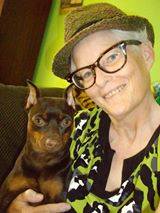by Cary Christopher and Lisanne Harrington
So this month’s theme is “Freeze”. Lisanne and Cary looked at each other and said, “What?”
That’s when the writer’s block set in. How do you write about “freeze”? We realize the editors here are trying to get us to be creative but hey, this is ridiculous. Still, what’s better to write about than writer’s block?
Almost every writer has had that moment when your creativity hits a wall. It could happen as you sit down with a good idea that you want to flesh out, or even in the middle of writing a book you’ve been plotting out for weeks. Suddenly, your imagination just “freezes”.
See what we did there?
Don’t Fight It
Anyway, writer’s block is a frustrating beast to contend with, because the more you fight against it, the worse it usually becomes. Have you ever played with one of those finger trap toys? If you don’t know what I’m talking about, it’s a tube, usually constructed of woven fabric or paper and it’s open on both ends. You put a finger in each side and when you go to pull your fingers out, the tube tightens. The more you pull, the tighter it gets. The only way out, is to relax and give in to the trap. If you do this, it will loosen and you can easily slide your fingers out.
Writer’s block typically works in a similar way. The more you fight it, the harder it digs in. However, if you shrug and accept it, you’ll find it loosens its grip.
So how do you “accept” writer’s block? Well, the trick is to change your focus. There are a number of ways to do this, so the list below is by no means a complete one. However, these are the ones that have worked best for us.
1. Do something
Getting up, putting away the notepad or laptop and actually doing a completely different activity makes your mind switch tracks. Instead of obsessing over the fact that you’re not writing as well as you wanted, your brain will turn to something new. While in the background, it’s also working out the problems with your writing. For Cary, running is the key. Lacing up his shoes and going for a quick run is all it takes to shake off the chains most of the time.
For Lisanne , washing dishes, folding laundry, or doing other mindless tasks works best. For whatever reason, these simple chores seem to awaken the muse, so much so that plot holes are filled, characters begin speaking to her, and the freeze usually ends.
Either way, being active is a great way to get your head back together and get back on track.
2. Take a shower
Okay, technically this falls under the “Do Something” category, but a shower is one of the most relaxing and isolated places in anyone’s home. Think about it. Anyplace you feel comfortable enough to sing without worrying about what other people think is probably good place to go if you’re locked up with writer’s block. What you need more than anything else is to relax and let go and a shower or a relaxing bath is just what the doctor ordered. The fact is, it’s a trick that’s worked for both of us on more than one occasion.
3. Write something else
There are a number of products out there, from books and websites to an actual deck of cards that contain thousands of writing prompts to help you rewire your brain. If you don’t want to get that far away from your subject though, start writing a tangent off of the main action. For instance, writing a scene that takes place “off camera” or even writing a back story for one of your characters can push your thinking into a different place.
Lisanne sometimes takes a relevant character (not necessarily the protagonist) and writes a short story that takes place before the novel’s story begins, something that leads them to where they appear in the novel.
4. Read something
It’s true. Stepping away from your own work and reading something else can loosen up the wheels and get you back on the road. However, Cary makes it a point to stay away from fiction. He’s found that if he begins to read something (even a short story) by another author when battling a writer’s block situation, his writing tends to take on qualities from the other author’s work. To avoid that, if he decides to take this path, he’ll typically read a magazine or newspaper instead.
One suggestion we’ve seen is to read a writer’s digest of some kind. The idea is that if you’re reading about other authors and what they’re accomplishing, you’re still in the same “zone” and may find an inspired way around your predicament. And even if you don’t, an author should take every opportunity to sharpen the tools in the toolbox, and by reading about other authors, you can easily pick up useful tips.
5. Write anyway
Okay, this one has arguments on both sides. Hear us out and make up your own mind.
Chances are, if you have writer’s block, you’re working on a first draft. First drafts are not meant to be perfect. In fact, far from it and no matter how hard you try to perfect your writing, you’ll never have a first draft that’s print ready. So the argument for this method is to stop sweating it! Push through and continue the narrative.
There are writers who swear by this method. In fact, in the book The Creative Compass: Writing Your Way From Inspiration to Publication, authors Dan Millman and Sierra Prasada put forth the idea that you’re supposed to write badly when writing your first draft. As they explain it, “The first draft requires a show of sinew, not nuance. We write badly because we need our early drafts to show us, in broad strokes, what we’re actually supposed to be writing about.”
What’s the argument against this idea? Well, Cary has a horror story about doing just this thing. In a book he’s been working on for the better part of a year, he hit a block. The first draft of the book (by his original estimation) was about 75% complete and he knew where he wanted to end up. In an effort to break his writer’s block, he wrote the conclusion and then went back to where he left off. That didn’t work. So instead, he decided to power through and just connect the dots to the end. A couple of weeks later, he’d typed out the final sentence but instead of feeling good about that first draft, he found he absolutely hated it.
In fact, he realized that part of his block was that he really hated the conclusion and it had gotten no better by forcing the narrative to go that way. So, what did he do?
He scrapped the last eight chapters of the book entirely. Then he let the whole thing sit for months while he turned his attention to another book. Only recently has he started writing on the “problem child” again. In this case, it’s getting a pretty serious rewrite, so the whole “write through it” solution probably wasn’t the best way to go about it.
Lisanne’s horror story is even worse. Writing under a publisher-imposed deadline, she found her story just wasn’t going to work, no matter how hard she tried or how much she pleaded with her muse. She ended up scrapping a whopping 30,000 words and struggled to start over with a fresh, new idea. It ended well, but getting there was a nightmare.
However, writing through it may work for you. In fact, there are many more tricks to get you “unfrozen”.
See? See how we did that again?
Anyway, we’d love to hear about your solutions to writer’s block. Leave us some comments and tell us your favorite.
***
Cary Christopher was born and raised in Florida and Georgia but has called Southern California home now for almost 20 years. He’s written extensively about music, movies and pop culture online and for various publications around SoCal. Now he primarily writes for his blog (www.carychristopher.com). His new novel The Wash is available on Amazon.
Link to my Amazon Authors Page: https://www.amazon.com/Cary-Christopher/e/B076FD8MJ3
 After sixteen years as a paralegal, I staged a coup and left the straight-laced corporate world behind forever. I now pander to my muse, a sarcastic little so-and-so who delights in getting the voices in my head to either all speak at once in a cacophony of noise or to remain completely silent. Only copious amounts of Diet Cherry Dr. Peppers and hamburgers will ensure their complicity in filling my head with stories of serial killers, werewolves, and the things that live under your bed.
After sixteen years as a paralegal, I staged a coup and left the straight-laced corporate world behind forever. I now pander to my muse, a sarcastic little so-and-so who delights in getting the voices in my head to either all speak at once in a cacophony of noise or to remain completely silent. Only copious amounts of Diet Cherry Dr. Peppers and hamburgers will ensure their complicity in filling my head with stories of serial killers, werewolves, and the things that live under your bed.
I live in SoCal, in the small town I fashioned Moonspell’s Wolf Creek after, with my beloved husband and persistently rowdy, always-has-to-have-the-last-word Miniature Pinscher, Fiona.
*O.C. Writers is a participant in the Amazon Services LLC Associates Program, an affiliate advertising program designed to provide a means for us to earn fees by linking to Amazon.com and affiliated sites. By clicking on the book links anywhere on this site, we earn a small commission from your purchase.







This is an extremely helpful article. Thank you!
I think the benefit of the “taking a shower to relax method” is the same reason Edison took a nap each afternoon. Apparently, the mind is most creative in the alpha state. Reading your article right now led me to confirm this fact and in so doing, look what I found!–an article that explains the rationale of your shower point: https://open.buffer.com/shower-thoughts-science-of-creativity/
Also, as a writer attempting my first novel, I was comforted to read that published novelists like yourselves have the need, on occasion, to throw out thousands of words. (I have a file folder with throw-aways that might end up being bigger than the novel itself!)